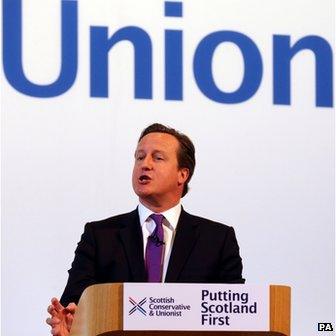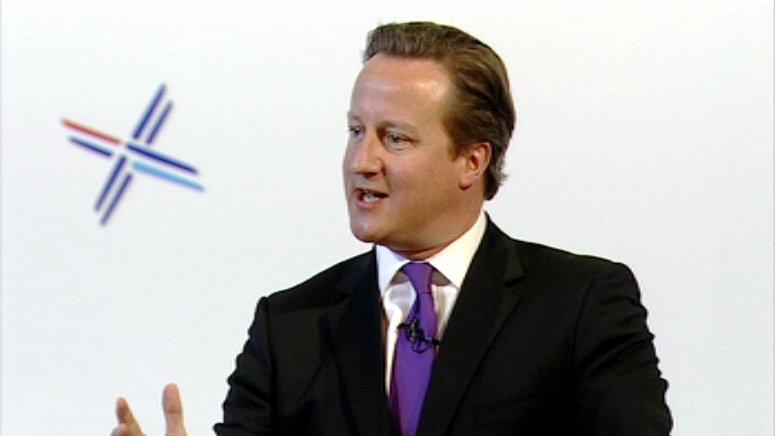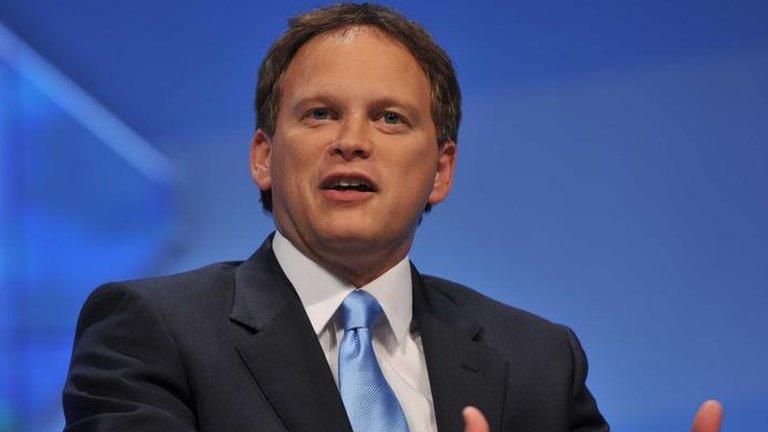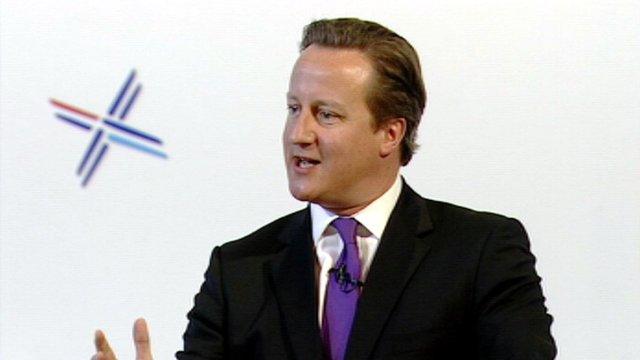Scottish Tory conference: A heart and head battle
- Published

David Cameron made is continued plea for the Union
The sun is shining, the ancient city of Stirling is looking splendid - and yet the world is not entirely cakes and ale here at the Scottish Conservative conference.
It would not be fair to exaggerate these matters. With regard to the future of Scotland, there is much more that unites the Tories than divides them. Independence? They're agin it.
The snags arise when they begin to consider whether they ought to endorse more powers for the Scottish Parliament as an alternative to independence, as a project to embed a devolved Scotland within the Union.
This is not, frankly, entirely comfortable territory for the Tories - and it shows. Some in the party endorse more powers reluctantly. Some with enthusiasm, arguing that a parliament with real fiscal power would enable the Tories credibly to advance a low-spend, low-tax offer.
Some are completely against the idea, regarding it as an unwarranted concession to Nationalism. Some in the hall perhaps wish the world to be other than it is, wish they were confronting classic Tory issues rather than a constitutional agenda which they find somewhat alien.
Either way, there is no debate on the conference floor here about the option of more powers - despite the fact that the Scottish party leader, Ruth Davidson, emphasised the prospect in her most recent keynote speech and set up a commission, under Lord Strathclyde, to examine such a notion.
Ms Davidson and others say that such a debate at the moment would be inutile - that it is better to wait for Lord Strathclyde and his team to report.
Cue an outbreak of grumbling and discontent from representatives who would have preferred an open conference discussion, rather than the debates which are taking place on the fringe and in the coffee bar.
Some senior insiders detect a sub-text. They say that some - not all, some - of the complaints at the absence of a debate are coded criticism of the leader who suggested that more powers be examined.
Ruth Davdison answered questions from website users
Certainly, David Cameron went out of his way to bolster Ms Davidson's leadership, going further than the issued text of his speech to back her "every step of the way". The formulation, incidentally, which he later used to endorse the Union.
Mr Cameron's objective in his relatively brief address was to add the element of passion to the arguments for the Union. Statistics alone, economics alone would not suffice, he said. It was important to appeal to the heart as well as the head.
In the hall - which was not entirely full - the audience loved that. They rose to applaud this vigorous endorsement of the second strand in the party's name, that of Unionism.
He made no mention of further powers - nor did Ruth Davidson when she contributed to a Rally for the Union session in the afternoon. (Her main speech comes tomorrow.)
The object plainly was to focus solely, at this stage, upon defending the Union rather than debating alternatives.
- Published7 June 2013

- Published7 June 2013

- Published7 June 2013
